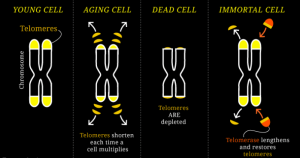Society has always been an obsession with immortality, with living forever and never having to fear death. This fascination with immortality can be found throughout legends and stories, from the Greek gods, to books such as Tuck Everlasting and movies like Peter Pan. Living forever seems like the perfect storybook ending where we can all live “happily ever after”.
Recently, immortality has come into the spotlight even outside the world of fiction with research by Dr. Julian Chen on DNA. While the normal cell may shrink and loose some of its DNA as the years go on, this study has potentially found a way to stop DNA shrinkage that leads to cell and organism death. The potential is in telomeres, which are protective capping structures on DNA. These caps act like the plastic at the end of shoelaces: without them, the strand would become frayed and we would not be able to tie our shoes anymore. In the cell, the loss of telomeres leads to DNA unraveling and an inability of the cell to divide, both of which lead to cell death, weakness, illness, organ failure and organism death.
This shrinking of telomeres is due to time, cellular divisions, and the telomere regulatory enzyme called telomerase. These enzymes keep cells from aging too fast by adding telomeres back onto aging DNA and adding lost DNA nucleotides back into place in the DNA strand. Dr. Chen hopes to target the telomerase, accelerating its activity to slow down the degradation of DNA and the resulting cell death. If he were to be successful, he would be creating immortal cells that can continuously divide and support life.
This study shows that the immortality may not just be found not in stories or myths or legends, but through science and in our own bodies. Yet as these scientific advancements take place, we must ask ourselves: is science going too far? Do we really want to live forever?
My original response to this was an optimistic yes, as I thought of all the good we could do. Without death, lives would not taken and no one would have to be separated from their loved ones. But after reading Dr. Chen’s article the potential to create immortal cells, I began to wonder if having immortal bodies would be worse than dying. What would happen with exponentially rising numbers of immortal bodies? How would the world deal with overpopulation, lack of resources, fighting, wars, and more? There is a lot that could go wrong with this model, and the errors would have a presence in society forever.
So while evading death may seem like a fairytale ending, immortality has the potential of leading to many social problems, such as overpopulation and lack of resources, that are currently only solvable by death. Therefore, death may be what is saving us in the end from suffering even though we try to fight it each and every day.
Sources:
Chen, Y., J.D. Podlevsky, D. Logeswaran and J.J.-L. Chen. A single nucleotide incorporation step limits human telomerase repeat addition activity. EMBO, 2018 DOI: 10.15252/embj.201797953
Arizona State University. “Hidden secret of immortality enzyme telomerase: Can we stay young forever, or even recapture lost youth?.” ScienceDaily. ScienceDaily, 27 February 2018. <www.sciencedaily.com/releases/2018/02/180227142114.htm>.


One response to “Do we really want to live forever?”